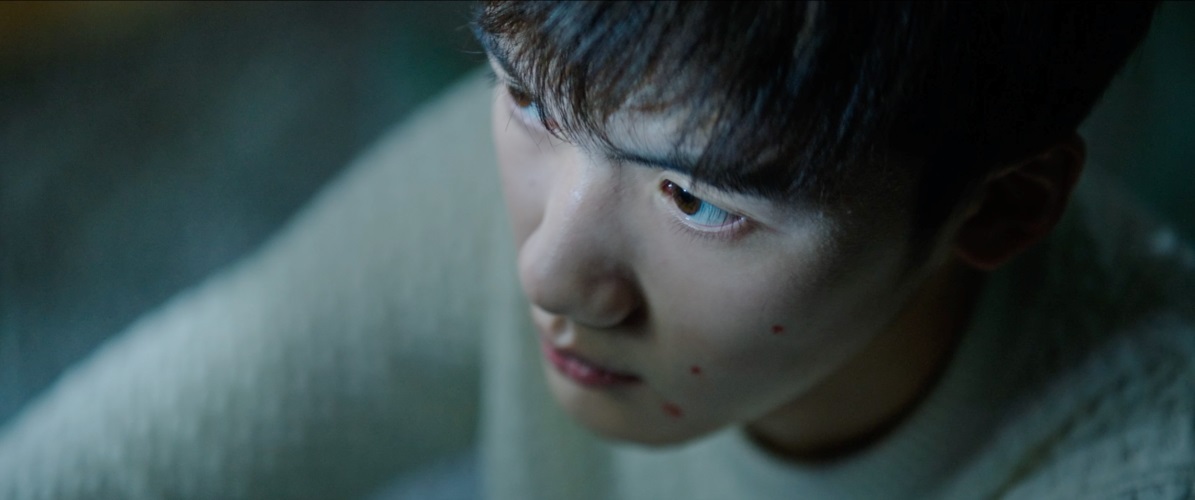
Jianjie Lin’s Brief History of a Family explores the tensions, power struggles, dangers, and desires of family life. The film opens with the telling image of a teenager trying to do pullups. Seen from behind, he is anonymous, he could be anyone. Struggling and straining with all his might, he is barely hanging on, yet he perseveres. The camera stays with him, documenting the tension in his back and muscles, as the soundtrack magnifies the effort of his breath, and the film’s magnificently ominous soundtrack sets the scene for impending harm. Yet despite the foreshadowing, when it comes, it’s surprising. The scene sets the tone for the film, which covers familiar ground, yet finds new paths to explore. Visually compelling, Brief History of a Family is moving and suspenseful, with excellent performances from an ensemble cast.
The boy from the opening scene is Yan Shuo (Xilun Sun), and when he is injured, another teen, Tu Wei (Muran Lin) comes over and takes him to the nurse. Wei offers Shuo a ride home on his bike, but the latter, somewhat sullenly, refuses and limps away. Wei seems determined to make friends, or at least, be kind, and when he encounters Shuo once more, he invites him to come to his home and play video games. This time, Shuo accepts. As the two boys arrive at Wei’s home, the camera lingers on the attributes of the apartment and its comforts. It is as if the viewer is seeing the affluent home through Shuo’s eyes, and in the appreciation of his gaze, one learns more about Shuo and his background.
There is a great economic and social disparity between Wei and Shuo. Wei’s family is very comfortably middle-class, his father is a biologist who works for a medical equipment company, his mother used to be a flight attendant, and his parents have high ambitions for their only son. The film never shows Shuo’s home and family, but his behavior reveals with certainty that he is unaccustomed to the abundance that Wei takes for granted. The two young men are also very different from one another in their characters. Shuo is quiet, reserved, and very serious about his studies, while Wei prefers video games to books. Although his parents hope he’ll gain acceptance to an Ivy League college, Wei aspires to make the city fencing team. It’s unlikely that these two would ever have become friends if circumstances had not brought them together.
When Wei’s parents meet Shuo, they are delighted by their son’s new friend. Shuo begins to spend more time at the Tu home, and his relationship with each of the family members becomes more complex. The family home is exposed as a treacherous terrain, replete with pain, secrets, and uncertainty. There is a deliberate ambiguity in the film, which along with the score by Toke Brorson Odin and sound design by Margot Testemale and Jacques Pedersen, gives the film an ominous quality. Visually, and in terms of narrative, what is hidden and unspoken is as significant as what is shown. One never sees Shuo’s home or family, all that the viewer knows about his background is what Shuo chooses to tell. Is he a reliable narrator of his own life? Is he a good kid born into poverty and misfortune, who is honestly trying to build a good life for himself, and genuinely simply enjoys spending time with the Tus, or a cunning schemer who is willing to use any means to obtain the affection and benefits the Tu family can bestow upon him?

The camera looks at the scene from a distance at times, then comes in close, as if to seek out the truth that is beneath the surface. At intervals, the images appear within a circle, as if the characters and their relationships are examined in a microscope. Each of the characters in this family dynamic has their own sorrows, secrets, and desires. Most poignant is Wei’s mother, movingly portrayed by KeYu Guo. A former flight attendant, she has fond memories of a more adventurous past, and although her current life as full-time wife and mother is comfortable, she is somehow a secondary character in her own life. A brilliant scene opens with a full screen of oranges on display in a supermarket, then opens out to show Mrs. Tu, who might be a cool mom in her black sunglasses, were it not for the inappropriately fancy dress, and the nervous position of her clasped hands. As she looks longingly at the display of pineapple, which she loves but never buys – and not for lack of money – she is the perfect image of hunger amidst plenty.
Brief History of a Family
Director: Jianjie Lin; Cinematography: Jiahao Zhang; Editor: Per K. Kirkegaard; Music: Toke Brorson Odin; Cast: Feng Zu, KeYu Guo, Xilun Sun, Muran Lin





